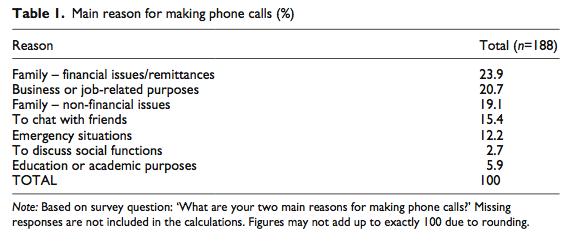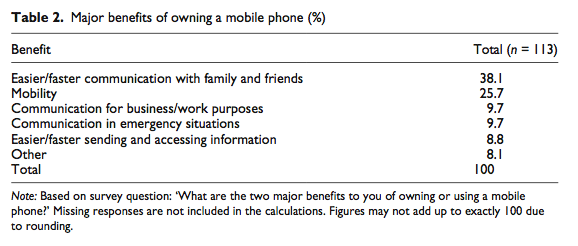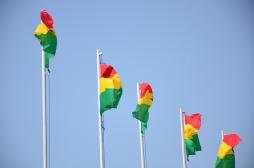ICT4D and M4D projects often focus on how mobiles can be used in developing countries, but the success and usefulness of these projects depends on the value mobile users place on their phones, and how they use them. "We Use It Different, Different: Making Sense of Trends in Mobile Use in Ghana," looks at how Ghanians use mobile phones in their day-to-day lives, mainly focusing on why survey participants started using a mobile phone, how they use it, and how they view the value of mobile phone ownership.
The report draws on data from in-person interviews (17 participants) and mobile surveys (197 participants), with a sample of participants coming from either a city, town, or village in order to get a wide range of responses. The report looks at how mobile phones are used for both personal and professional reasons, and examines both the social and economic benefits of mobile ownership and use. Participants in the study "represented a broad range of occupations including white-collar workers, village elders, students, farmers, and fishermen," answering questions about how mobiles fit into their lives.
The majority of respondents reported that their primary reason for getting a mobile phone is connectivity; in a question in which respondents ranked how they viewed the importance of mobile contact:
- 74.6% said their top reason for getting a mobile phone was "So other people can contact me"
- 69.5% said "So I can contact other people"
- 36.4% said "Emergency situations"
The responses show that for the survey and interview participants, being able to be contacted was more important than their ability to contact others, and that personal and social reasons were seen as the primary benefit of mobile ownership. Some respondents did use the phone for work (such as a seamstress who used it to call clients about orders, and a taxi driver who used the phone to find work), but most survey and interview participants said that their main reason for buying and using mobile phones was personal communication. However, this personal communication often bled over to include economic benefits (such as coordinating remittances among family members or finding work), even though the majority of respondents viewed mobile phones as a social tool rather than an economic one.
Below are two charts from the report showing 1) participants' main reasons for making mobile calls and 2) how participants viewed the major benefits of mobile ownership: 

The researchers' findings show that, among the Ghanian survey participants, the mobile phone is primarily a social tool that can have economic benefits, not primarily an economic tool. The study makes a good point about how aid workers and developers should not impose outside expectations on how mobiles will be used by beneficiaries, and they conclude:
There is an underlying assumption in most ICT4D work that users will appropriate ICTs to fulfill the goals envisioned by the project designers. However, users choose which livelihood goals they want to pursue and with which livelihood strategies; their behaviors cannot be dictated, especially with a technology as personal and flexible as the mobile phone.
Photo via Flickr user Ben Sutherland
| Featured Research: Making Sense of Mobile Phone Use in Ghana data sheet 1962 Views | |
|---|---|
| Countries: | Ghana |


Post new comment